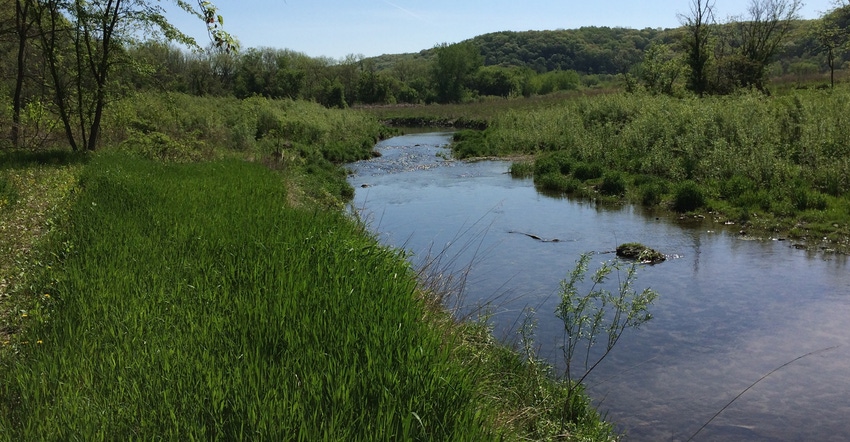April 29, 2020

USDA’s Natural Resources Conservation Service announced in mid-April it is investing $22.8 million in Iowa for three partner-driven conservation projects through its Regional Conservation Partnership Program. NRCS will leverage $42.4 million in partner contributions in Iowa.
“These are the first RCPP awards under the 2018 Farm Bill,” said Kurt Simon, NRCS state conservationist in Iowa. “Through collaboration and aligning our resources toward a common goal, we’re making an impact for natural resource conservation that could never have been realized on our own.”
RCPP uses a partner-driven approach to fund innovative solutions to natural resource challenges. Through RCPP, NRCS and partners work together with private landowners and farmers to use a variety of conservation activities, including land management practices and systems, short-term land rentals, conservation easements, and watershed structures. The mix of conservation activities carried out under each project depends on a project’s goals, objectives and conservation benefits.
3 Iowa RCPP projects
These projects offer impactful and measurable outcomes, Simon says. They will support diverse ag and natural resource objectives, from helping farmers improve water quality, soil health and drought resiliency to protecting drinking water supplies and enhancing wildlife habitat:
North Raccoon Partnership for Soil and Water. This project is led by the Iowa Soybean Association in collaboration with a diverse list of partners including ag retailers and the city of Des Moines. The partnership will take an innovative approach to deploying conservation agronomists in ag retailer locations to minimize barriers to producer adoption of best management practices. Targeted practices include no-till, cover crops, denitrifying bioreactors, saturated buffers and wetland restoration. NRCS funding amount is $9.8 million and partners’ contribution is $16 million.
Turkey River Watershed Partnership Project. It will be led by the Iowa Department of Ag and Land Stewardship. The plan calls for long-term adoption of management and structural practices to reduce water quality degradation in the Turkey River Watershed by removing about 400,000 pounds of nitrogen. NRCS funding amount is $3 million and partners’ contribution is $3.9 million.
Iowa Systems Approach to Conservation Drainage. This project, also led by IDALS, includes a diverse list of business partners to demonstrate improved farm profitability and sustainability on some of the most intensively farmed land in Iowa. The project aims to help farmers plant nearly 150,000 acres of cover crops, install 50 denitrifying bioreactors and saturated wetlands, and focus on many other water quality, flood control and source water protection practices. The project is in the Des Moines Lobe, encompassing north-central Iowa. The NRCS funding amount is $10 million and partners’ contribution is $22.5 million.
Nationally, NRCS is investing $206 million for 48 partner-driven conservation projects across 29 states, while leveraging nearly $300 million in partner contributions.
Partner contributions important
Though RCPP was first authorized in the 2014 Farm Bill, the 2018 Farm Bill made changes to strengthen the program and simplify its rules. RCPP is now a stand-alone program with $300 million annually available for partner-driven projects. In addition to the general RCPP projects recently announced, NRCS has already awarded more than $50 million for 18 renewals of 2014 Farm Bill projects. A separate RCPP Alternative Funding Arrangements funding announcement is open until May 18.
Since 2015, RCPP has combined $1 billion in NRCS investments with close to $2 billion in partner dollars to implement conservation practices nationwide. There are currently 341 active RCPP projects and close to 2,000 RCPP partners. Learn more about RCPP on the NRCS website.
“We greatly appreciate USDA’s ongoing financial and technical support of conservation work in Iowa,” says Iowa Secretary of Agriculture Mike Naig. “There’s tremendous value in federal, public and private partners working with farmers and landowners to test, measure and implement new approaches to conservation. We’re working to deploy the most effective, cost-efficient conservation practices across the state to improve water quality locally and downstream.”
Building upon previous success
RCPP projects help support and increase available funding for state, federal and private partners who are working with farmers and landowners to implement practices to achieve the goals outlined in the Iowa Nutrient Reduction Strategy.
IDALS has already successfully led and partnered on several RCPP projects in Iowa. One project currently underway is the Midwest Agriculture Water Quality Partnership project, co-led by IDALS and the Iowa Ag Water Alliance. The $11 million project aligns 48 partners — including 19 agribusinesses — and $39 million in non-federal matching funds to improve water quality. As a result, MAWQP has added more acres of cover crops, bioreactors, terraces and wetlands in the region.
Systems approach needed for conservation drainage
Subsurface agricultural drainage systems are critical to maintaining the productivity and sustainability of cropland. Current measurement efforts of tile drainage systems only evaluate drainage productivity and soil conservation benefits, without taking into account agronomic health, soil health or water quality improvements. However, the recently announced Iowa Systems Approach to Conservation Drainage project, funded by USDA, will measure those additional benefits.
During this five-year demonstration project, the Iowa Department of Agriculture and its partners will pair ag drainage systems with edge-of-field conservation drainage and in-field management practices in north-central and central Iowa. The goal of the project is to demonstrate the connection between in-field practices that improve agronomic, soil health and nutrient use efficiency, and edge-of-field practices that further improve water quality. The project is expected to reduce nitrogen losses by 1.185 million pounds per year and phosphorus losses by 40,000 pounds per year.
About the Author(s)
You May Also Like






